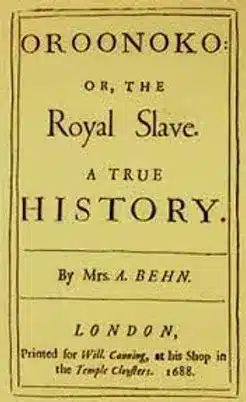
In 1929, Virginia Woolf wrote that “All women together ought to let flowers fall on the tomb of Aphra Behn… For it was she who earned them the right to speak their minds.”
If that’s the case, why have so many people never heard of Aphra Behn?

The answer is diabolical: for while Aphra lived, and for centuries after she died, there was a concerted effort to ensure her literary contributions and reputation were destroyed. As one critic wrote in 1862, “it is a pity her books did not rot with her bones.”
Ouch.
So, who was this woman, reviled as a “wanton hussy”, “a harlot”, and considered “morally depraved”, yet somehow survived (just) attempts to wipe her memory from history?
Born in Kent in 1640 and raised as a Johnson, Aphra wrote broadly about love, female sexual desire, male impotence, and “sexy politics and political sex.” She was also the first English person to write a novel (Oronooko) thirty-seven years before Daniel Defoe’s Robinson Crusoe – a book still credited with being the first.

For fear of sounding like a television commercial: wait, there’s more.
Aphra was also an early abolitionist who lived for a time in South America. On her return to England, she married Johannes Behn. After her husband’s death, she was recruited as a spy for King Charles II. Sent to Antwerp in 1666, she was to try and enlist a former lover, William Scott, a double agent, back into the English network. She was paid a fraction of what she was owed for services and, while overseas, was constantly denigrated, undermined and her work dismissed by her intelligencing peers. Upon her return home, she warned the English government about a likely attack on the King’s fleet stationed in the Medway (a tributary of the Thames) but was ignored and flung into debtor’s prison. Subsequently, the fleet was destroyed, and the King’s flagship towed away by the triumphant Dutch.

With her reputation in tatters, Aphra was forced to earn a living. She began to write plays and whatever else she could to survive. She would oft say “I write for bread.”
The pay was piecemeal and always a fraction of what the men earned. Ahead of her times in so many ways, Aphra was punished for her searing wit and intellect, sexual curiosity, and refusal to be silenced by her vociferous critics. Detractors called her a “whore” – because she sold her body (of work), “a vile woman” and her writing was disparaged even as it was being enjoyed. According to her biographers, even though she worked so hard and through rampant and toxic criticism, misogyny, and defamation, she also had supporters – some of them, the most famous rogues of the Restoration era.

As she grew older, she suffered chronic physical pain and illness, dying in 1689 in what was tantamount to poverty.
Not long after Aphra’s death, a biography and compilation of her works appeared, written by ‘One of the Fair Sex’ (identity unknown) who claimed to have intimate knowledge of Aphra and her writings. This was a gift for this historical fiction writer. I began to wonder who this woman was and what her relationship to Aphra — personally, professionally and to her work — might have been. And so, my latest novel, The Escapades of Tribulation Johnson was born. Through Aphra’s long-lost cousin, Tribulation, we come to know Aphra — at least those parts of herself she allows us access to.
This was a time when plots to kill the king abounded, and there were ferocious religious and political schisms. The bawdy, hedonistic word of theatre – the principal setting of the novel – was both an escape and a space where plots flourished.

The social, sexual and political context of the era added fuel to the fire burning in my belly as I sought to repatriate Aphra and present a real working woman — two of them — seeking to simply earn a living wage and contribute creatively and intellectually to their society, but who were constantly met with hurdles, judgement, and slander.
The most remarkable thing about Aphra is that despite efforts to marginalise and erase her, her legacy has survived. It’s survived in the female writers who came after, and because of biographers and revisionist historians and feminists. Yet, Aphra herself, imperfect, fascinating, and complex, largely remains hidden in shadows.
It’s time to bring this remarkable writer, lover, and spy into the spotlight – back to centre stage.
Enter: Tribulation Johnson.
